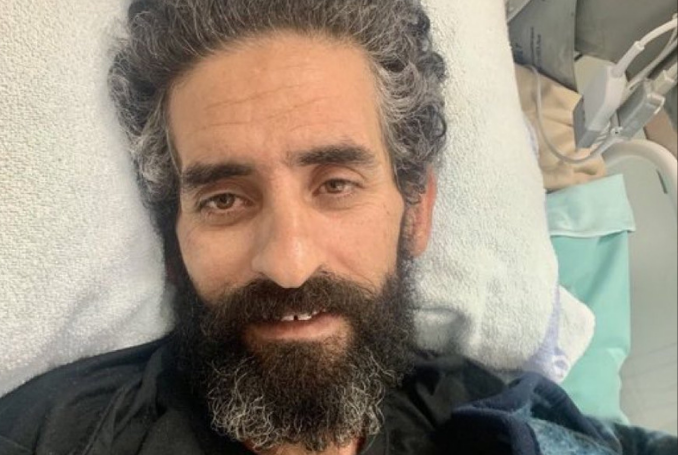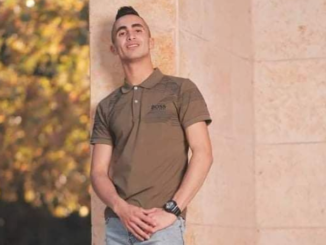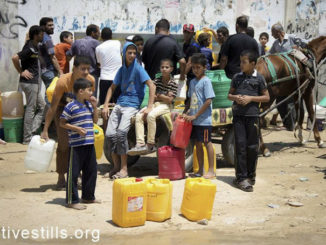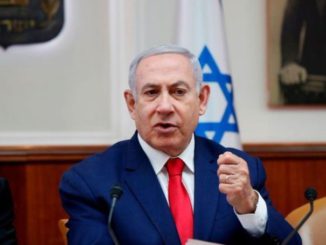
By Ramzy Baroud 
As soon as media reports emerged regarding a deal between Palestinian prisoner, Hisham Abu Hawash and the Israeli prison authorities, Israeli extremists, led by Knesset member Itamar Ben-Gvir, angrily raided the Assaf Harofeh Hospital where Abu Hawash was being held.
A Palestinian political activist, Abu Hawash, 41, is a father of five. He was arrested by the Israeli army from his home in the town of Dura near Al-Khalil (Hebron) in October 2020. For the last consecutive 141 days, prior to the agreement, Abu Hawash has staged a hunger strike, which will go down in the history of Palestinian resistance as one of the longest and, arguably, most consequential.
Ben-Gvir and other right-wing Israelis were enraged by the government’s decision to release Abu Hawash on February 26, at a time that the Naftali Bennet coalition is laboring to demonstrate its pro-Jewish settlers’ credentials and overall hard-line policies against any form of Palestinian resistance. Indeed, for many Israelis, any such compromise is considered an outright defeat for Israel and an unquestionable victory for Palestinians.
The steadfastness of Abu Hawash, who, days before the agreement, fell into a coma, as his gaunt, emaciated body faltered under the immense pain of his unrelenting hunger strike, was the trademark of the type of resistance displayed by thousands of Palestinian prisoners in the past.
Currently, there are 4,600 Palestinian prisoners in Israeli prisons. Most of them are imprisoned following trials in Israeli military courts. These trials do not live up to the minimum requirements of fairness as defined by international law or the legal norms practiced, even in nominally democratic countries.
Additionally, according to Addameer’s prisoner support group, there are 500 Palestinians who are held without trial or due process, a draconian system known in Israel as ‘administrative detention’.
Abu Hawash, too, was held according to that same notorious system, described by Israeli human rights group B’tselem as “incarceration without trial or charge,” based on an unsupported allegation “that a person plans to commit a future offense”.
Abu Hawash’s detention was renewed repeatedly, as is often the case when Palestinian prisoners are arrested merely as a form of punishment for their political activities or anti-occupation speech. In such cases, they are kept in total isolation. They all experience psychological torture and, in many cases, physical torture as well, where their Israeli interrogators labor to exact confessions that can be used against them in military courts.
The trials of Mohammed Al-Halabi are a case in point. It is perhaps the most outrageous display of the horrific system of the so-called administrative detention. The manager of operations of World Vision in Gaza has been held in solitary confinement for over five years. Since then, he has been paraded over 150 times before an Israeli military court. One of Palestine’s most prominent humanitarians is now living the endless nightmare of neither being free nor being charged.
In the case of Abu Hawash, the decision to undergo a hunger strike was not an arbitrary one. On the contrary, it was a strategic decision inspired by the popular resistance witnessed in Palestine last May and the renewed sense of vigor and unity among Palestinians.
The struggle for freedom by Palestine’s political prisoners is one of the most unifying pillars of the Palestinian cause. Though most prisoners, like most Palestinians, are directly or loosely affiliated with specific political parties, these affiliations quickly dissipate as soon as they enter – shackled and browbeaten – to their respective Israeli dungeons.
Whether supporters of Fatah, Hamas, a socialist group or any other movement, a Palestinian, upon his imprisonment, ceases to be a member of a faction per se, but is a Palestinian first and foremost. This can be easily deciphered from the kind of literature that is often smuggled out of Israeli prisons.
For example, the prisoners’ document of 2006, prepared and signed by the leaders and prominent members of all Palestinian political parties in prison, remains the strongest and most genuine call for national unity ever written. This spirit of unity emanating from inside Israeli prisons is precisely why the Palestinian people continue to hold this collective perception that the prisoners are the true leaders of Palestinian society. Abu Hawash, like many other prisoners who underwent the grueling hunger-striking experience, must have known this very well. He must also have fully appreciated the fact that millions of Palestinians throughout Occupied Palestine and the world watched anxiously and were already acting in various ways to display their solidarity with Abu Hawash and his family.
A day prior to the Israeli commitment to releasing Abu Hawash, a large rally in Gaza brought community leaders and spokespersons of all resistance groups together. One prominent figure pledged that the death of Abu Hawash would be considered an act of ‘assassination’, promising that a rebellion would soon ensue to avenge him. Hours later, the Israeli government agreed to the terms as set forth by the Abu Hawash family.
The extremist Ben-Gvir was actually right. The Israeli government did, in fact, grant Palestinians a victory. But why would Israel concede at a time that it refuses to make a single concession regarding its illegal settlement construction, its growing apartheid, military occupation or the status of Jerusalem? The reason is not related to the prisoner himself, but to his centrality in the collective consciousness of Palestinians. If Abu Hawash died, Palestine would have erupted into a new rebellion, and, judging by the events of May, all kinds of resistance would have been put on display, a crisis that Bennett’s shaky coalition cannot afford.
It is quite a powerful imagery to think that a dying man, tied to a hospital bed, would force Israel to concede on such a crucial issue as that of the freedom of a Palestinian. Just imagine what would happen if this powerful energy of Abu Hawash is multiplied by thousands like him, and sustained by the resistance of millions of Palestinians throughout occupied Palestine. This is the true ‘doomsday’ scenario that Israel fears most.

– Ramzy Baroud is a journalist and the Editor of The Palestine Chronicle. He is the author of six books. His latest book, co-edited with Ilan Pappé, is “Our Vision for Liberation: Engaged Palestinian Leaders and Intellectuals Speak out”. Dr. Baroud is a Non-resident Senior Research Fellow at the Center for Islam and Global Affairs (CIGA). His website is www.ramzybaroud.net







